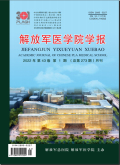解放军医学院学报2024,Vol.45Issue(5):449-456,8.DOI:10.12435/j.issn.2095-5227.2024.031
育龄期人群对扩展性携带者筛查的了解、态度、支付意愿、实施偏好以及影响其接受筛查的关联因素:一项多中心横断面调查研究
Knowledge of,attitudes to,willingness to pay for,and preferences for implementation of expanded carrier screening among reproductive-age population,and associated factors of acceptance of screening:A multicenter cross-sectional survey study
摘要
Abstract
Background Birth defects are a public health issue worldwide.Expanded carrier screening(ECS)is an effective measure to prevent birth defects.Objective To understand the knowledge of,attitudes to,and behavior of ECS in the childbearing-age population in China and influencing factors of the willingness of accepting ECS.Methods This cross-sectional study was conducted to survey individuals visiting 11 prenatal diagnosis institutions across the country from August 2022 to September 2023.Via a online self-administered questionnaire the survey was mainly to understand attitudes towards ECS,preferences for implementation,willingness to accept ECS,and associated factors were analyzed by logistic regression.Results A total of 24 923 questionnaires were collected,after excluding 13 questionnaires from non-Chinese nationals,24 910 valid questionnaires were obtained,with a validity rate of 99.95%.Among the respondents,54.42%were female and 45.58%were male,with age primarily ranging from 26 to 35 years old(19 601 individuals,accounting for 78.69%).21 110 respondents(84.75%)were actively trying to conceive,and 6 395 respondents(25.67%)reported a history of unexplained miscarriages either by themselves or their partners.Approximately 38.99%(9 714/24 910)of them had no understanding of ECS,yet 91.36%(22 757/24 910)expressed their willingness to undergo ECS.The most common reason for accepting ECS was to understand the risk of having offspring with genetic diseases,accounting for 88.18%(20 066/22 757);The most common reason for refusing ECS was the belief that there was no need for screening due to the absence of a family history of genetic diseases,accounting for 33.91%(730/2153).About 2/3(60.22%,13 704/24 910)ofrespondents expressed a desire to know all genetic disease carrier informationforbothpartners,89.64%(20 400/24 910)preferred a more efficient simultaneous screening model,80.15%believed that testing should be done during the preconception period,and 60.37%thought it should be conducted during premarital examinations.About 2/3(15 886,63.77%)cases were willing to pay less than 1 000 yuan per person.Logistic regression shows younger age,higher education level,higher monthly income of couples,having medical insurance,and higher level of awareness and understanding of ECS are associated with a greater willingness to undergo ECS testing among the childbearing population(OR>1,P<0.05).Conclusion The survey respondents have limited understanding of ECS,with some misconceptions about ECS present among the participants,but the overall attitude is positive.Younger individuals,those with higher education,higher income,health insurance,and better understanding of ECS are more willing to accept ECS.To reduce the incidence of recessive genetic diseases and promote the benign development of expanded carrier screening,it is necessary to conduct ECS and genetic knowledge popularization campaigns among couples of reproductive age.关键词
扩展性携带者筛查/优生优育/单基因遗传病/横断面调查/问卷调查Key words
expanded carrier screening/eugenics and childbearing/monogenic disorder/cross-sectional study/questionnaire survey分类
医药卫生引用本文复制引用
付晓琳,罗春玉,戚庆炜,尹爱兰,李树铁,张春燕,周红辉,卢彦平,侯伟,张蔓丽,毛翛,文娟,刘珊玲,袁静,钱叶青,赵彦艳..育龄期人群对扩展性携带者筛查的了解、态度、支付意愿、实施偏好以及影响其接受筛查的关联因素:一项多中心横断面调查研究[J].解放军医学院学报,2024,45(5):449-456,8.基金项目
国家重点研发计划(2021YFC1005303) (2021YFC1005303)

